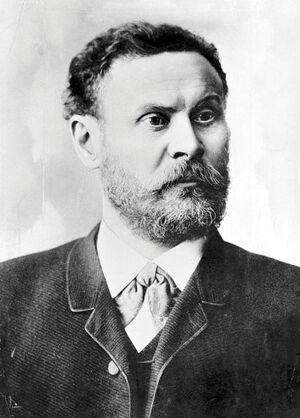Otto Lilienthal (nonfiction): Difference between revisions
No edit summary |
No edit summary |
||
| Line 10: | Line 10: | ||
<gallery> | <gallery> | ||
File:Henrietta Bolt.jpg|link=Henrietta Bolt|1896: Engineer and alleged time-traveller [[Henrietta Bolt]] warns "flying man" | File:Henrietta Bolt.jpg|link=Henrietta Bolt|1896: Engineer and alleged time-traveller [[Henrietta Bolt]] warns "flying man" Otto Lilienthal that he is in danger, but Lilienthal insists that his career depends upon "never backing down from the sky." | ||
</gallery> | </gallery> | ||
Revision as of 07:21, 10 August 2018
Otto Lilienthal (23 May 1848 – 10 August 1896) was a German pioneer of aviation who became known as the flying man.
He was the first person to make well-documented, repeated, successful flights with unpowered airplanes.
Newspapers and magazines published photographs of Lilienthal gliding, favorably influencing public and scientific opinion about the possibility of flying machines becoming practical.
On August 9, 1896, his glider stalled and he was unable to regain control. Falling from about 15 m (50 ft), he broke his neck and died the next day, 10 August 1896.
In the News
1896: Engineer and alleged time-traveller Henrietta Bolt warns "flying man" Otto Lilienthal that he is in danger, but Lilienthal insists that his career depends upon "never backing down from the sky."
Fiction cross-reference
Nonfiction cross-reference
External links:
- Otto Lilienthal @ Wikipedia

